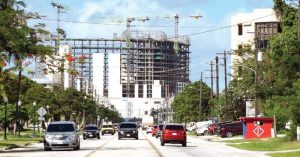Torres: We are not done yet

The still unfinished Imperial Pacific Resort hotel and casino towers over Garapan as cars pass by Beach Road on a busy Wednesday afternoon. Labor issues have hampered several construction projects on Saipan due to the current CW-1 problem. (Jon Perez)
Thus said Gov. Ralph DLG Torres yesterday during a meeting with legislators, the business sector, and other stakeholders on Capital Hill in response to the dramatic CW-1 slot reduction of 3,000 for fiscal year 2018.
“We are not done yet. I am glad that [U.S. Citizenship and Immigration Service] did not reduce 6,500 slots as originally proposed last October. So we went to D.C. to plead for less than 3,000 because anything less is good for us. I also told them that CWs are not just numbers, they are people who are here that cares for the CNMI economy and livelihood,” he said.
Torres convened the Social Economic Development Council meeting yesterday after USCIS announced late Tuesday night its plan to zero down the CNMI’s foreign workforce, starting by capping the CW-1 program at 9,998 this fiscal year, 4,999 in fiscal year 2019, and 2,499 for the first three months of fiscal year 2020.
Torres reiterated that his administration’s work for its growing economy.
“As much as 3,000 slots reduced will hurt the CNMI economy [but] it is still not 6,500 as originally proposed. Was it a success that we stopped the 6,500 reduction? There was great work put into it and now we are going to work on that 3,000 reduction to go down as well,” he said.
Torres said when he met with President Donald Trump in Hawaii last month, the discussion was about how exactly a drastic reduction of foreign workers will damage the economy.
“He then told John Kelly, the chief of staff, to make sure that our needs are accommodated. Unfortunately, that trip in Asia took longer and he was not able to reach out to USCIS and give a direct order.
“I got a phone call from the White House this morning and they are very much concerned about the numbers. I got a hold of Jim Caroll, chief of staff of Gen. Kelly, and I will be meeting with him on Dec. 11. What I asked from them is to have an open communication with me, the business community and see the drastic changes within our economic stability that this reduction will result to,” he added.
According to Torres, acting Department of Homeland Security secretary Elaine Duke will be confirmed in two weeks and he plans to fly to D.C. for that and have direct talks with her.
“Eventually, she will be the one who will make a decision and we will be coordinating that with a meeting with the president,” he said.
Northern Marianas Business Alliance Corp. chair Alex Sablan said there is still an opportunity to lessen the reduction outlined by USCIS.
“Apparently, the White House has called the administration and there’s an opportunity to get an increase in CW-1 slots from the current established slots of 9,998 and still work out the details. At the end of the day, that train is leaving the station every single year. There will be a reduction until we find a solution to our Public Law 110-229 scenario that goes to zero eventually.”
P.L. 110-229 placed CNMI immigration under federal control and gave birth to the CW program.
“The NMBAC and SEDC task force…have been working for the last year and a half, talking about what provisional changes can be made until we are blue in the face. We believe the solution is to get legislation dropped in the U.S. Congress to make the necessary changes to tweak Public Law 110-229 so that it will make sense for our economy,” said Sablan.
Torres asked the stakeholders present at the meeting to be pro-active in expressing how this reduction is going to affect their businesses, employees, and constituents.
“The federal government reads our papers and is updated about the CNMI. So we need data from the big industries like Hotel Association of the Northern Mariana Islands on the big impact and effect caused by the 3,000-slot reduction. We’d also like to reach out to small to big businesses to start talking about what’s going on.
“We need to get a bill passed and to do what we need to get legislation going. We need our local labor [department] to get data that we can use in D.C. and we need the community’s help because we will all feel this reduction affect our economy,” he added.
Torres feels positive that the CNMI has the support of the White House.
“They will amend the law according to what is feasible for us here. They acknowledge the relationship we have with them and they will do what they need to do to assist us,” he said.
“I know it’s not the best time to receive this information as we near Thanksgiving. But we’ve seen worse days in the CNMI and I’m sure we can weather these hiccups,” added Torres.



























